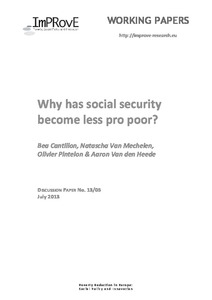Why has social security become less pro poor?
"The present paper argues that we are witnessing an increase of the tensions between the three main goals of social security systems (poverty alleviation, securing living standards and prevention) and that, as a consequence, the poverty-reducing capacity of social transfers has come under press...
| Main Authors: | , , , , |
|---|---|
| Institution: | ETUI-European Trade Union Institute |
| Format: | TEXT |
| Language: | English |
| Published: |
Antwerp
2013
ImPRovE |
| Subjects: | |
| Online Access: | https://www.labourline.org/KENTIKA-19124165124919423479-Why-has-social-security-become.htm |
| Summary: | "The present paper argues that we are witnessing an increase of the tensions between the three main goals of social security systems (poverty alleviation, securing living standards and prevention) and that, as a consequence, the poverty-reducing capacity of social transfers has come under pressure. The paper focuses on the working age population in 25 EU countries and on the good years before the crisis. Three different data sources are used: ECHP, its successor EU-SILC and the German SOEP. The paper augments the traditional pre-post approach by considering more direct policy indicators such as spending levels, observed average benefit levels and theoretical tax benefit packages and by focussing on the distinction between work-poor and work-rich households. We find that in many countries the relative decline in poverty reduction has primarily affected work-poor households. This observation is confirmed by more direct policy indicators. It may support the hypothesis that in many countries the poverty alleviation function of social protection has come under pressure as a consequence of a shift of attention towards preventing benefit dependency by recommodification on the one hand and ‘securing living standards’ for working families on the other hand." |
|---|---|
| Physical Description: | 28 p. Digital |

